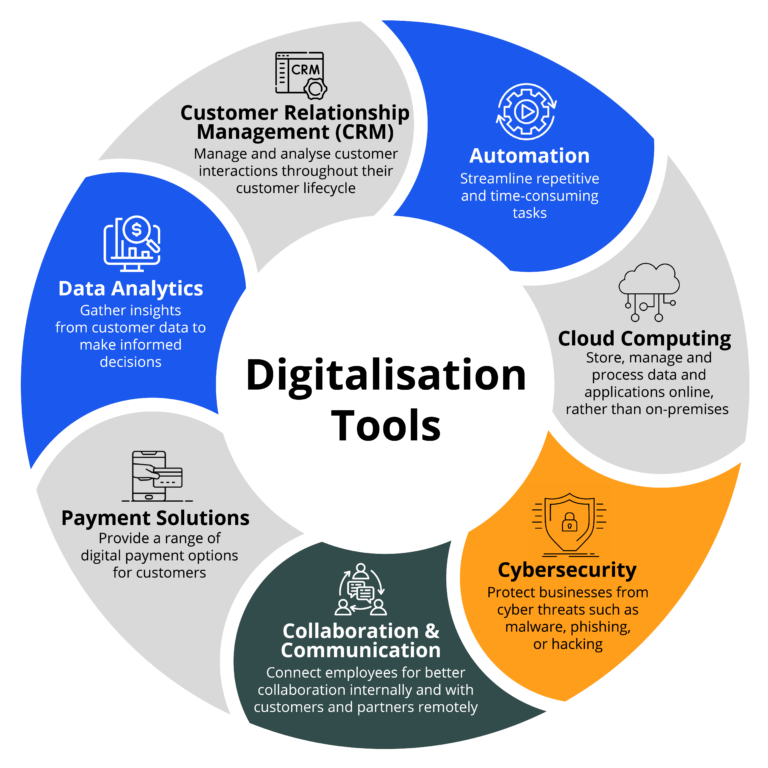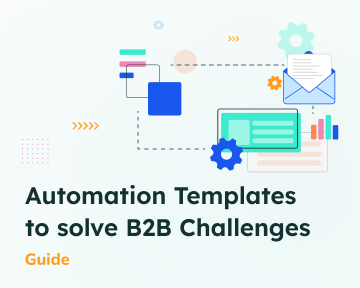The ultimate answer for Malaysian small and medium enterprises (SMEs) to succeed is via digital transformation. It involves the integration of digital technology into every aspect of a company, resulting in significant alterations to how the business operates and provides value to its customers. Effective digital transformation triggers a cultural transformation that questions traditional business procedures, promoting experimentation and a willingness to embrace the possibility of failures.
Most importantly, digital transformation also helps small and medium-sized businesses to become more efficient, competitive, and adaptable to change.
Did you know?
The Malaysian government aims to attract $16.1 billion in digital investment by 2025 and for the sector to contribute to more than 22.5 percent of GDP.
Source: Reuters Plus, 2023
As a leader yourself, you may be wondering, how can you get there and what steps should be taken in order to digitally transform your business.
1. Create a Digital Strategy
Start by defining a clear digital strategy that aligns with your business goals. Determine which tools and technology are relevant to your business and how they can help you achieve your objectives. As an increasing number of enterprises embrace online operations, your digital strategy can encompass this dimension. Furthermore, if your business currently functions solely in the digital realm, your digital strategy essentially becomes your overall business strategy.
To have a better understanding of relevant tools in the market that may be suitable for your business, check out our blogpost on some of the main marketing tools Malaysian SMEs are implementing to scale up in the digital era.
2. Foster a Digital Culture
Encourage your employees to embrace digital technology and to be open to change. Provide training and support to help teams to develop the necessary digital skills. In companies with developed digital cultures, most employees utilise digital technologies to collaborate, innovate, and provide customers with access to products, services, and support. Recognise that employees should be provided with relevant training if a new tool is being implemented in the business’ standard processes. When choosing a digital tool from service providers, remember that you should not only be subscribing to the tool itself – but also the service and support that comes with it. With the right support and onboarding given, the adaptation of new technologies within the team becomes easier and more efficient.
3. Start Small
You don’t need to transform your entire business all at once. Instead, start with a small project that can deliver quick wins and build momentum for future initiatives. Also known as the lowest hanging fruit. Try to experiment and test new digital tools and technologies, but avoid risks in significant business operations.
4. Use Data Analytics in Decision Making
Use data analytics to make informed decisions and to measure the impact of your digital initiatives. This will help you identify areas for improvement and optimise your processes. Accurate information should be gathered and decisions are made based on data-based conclusions, not on feelings, opinions, or experiences.
Here are key characteristics of a streamlined, data-driven approach to decision-making:
- KPI tracking. Use key performance indicators (KPIs) aligned with strategy.
- Keep a record of the rationale. Write down why you made the decision, and what it was based on.
- Learning from mistakes. Analyse the outcomes of bad and good decisions, creating learning and improvement cycles.
5. Enable Cybersecurity
As you adopt digital technologies, it’s important to ensure that you have robust cybersecurity measures in place to protect your business and customer data. According to a study commissioned by Centrify, 65% of individuals whose personal data was breached lost trust in the organisation that experienced the breach (either directly, or as a result of a breach in one of their contracted vendors). A reliable and resilient digital transformation can only be achieved when it has a foundation of cybersecurity beneath it. To protect your ROI, reputations and customers, your organisation should build cybersecurity groundwork before the digital transformation can safely occur.
Did you know?
65% of individuals whose personal data was breached lost trust in the organisation that experienced the breach (either directly, or as a result of a breach in one of their contracted vendors)


In the current era of widespread digitalization, the importance of digital transformation cannot be underestimated for any scale of business. By embracing the current changes and adapting digital tools for your business, you are preparing for a long-term journey and higher chances of success in future.
Whats next?
In this blogpost, we highlighted various tools that contribute to successful digital transformation of businesses. Our team consists of leading professionals in Marketing Automation and CRM, who are ready to assist you in understanding its potential for your business via a 1-on-1 personalised Marketing Automation and CRM consultation or to recommend a solution which will ultimately satisfy your business needs.





